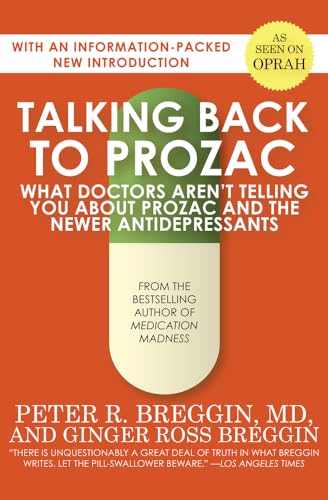Talking Back to Prozac
What Doctors Won't Tell You About Today's Most Controversial Drug
Peter R. Breggin; Ginger Ross Breggin
BOOK REVIEW

In a world increasingly dominated by the quick-fix mentality, Talking Back to Prozac: What Doctors Won't Tell You About Today's Most Controversial Drug emerges as a fierce clarion call. Written by Peter R. Breggin and Ginger Ross Breggin, this book does more than critique the seemingly miraculous capabilities attributed to SSRIs; it slaps you awake with startling truths that are often suppressed in the conversation surrounding mental health medications. With an audacity that ignites fiery debates, the authors beckon you to reassess the pharmaceutical landscape that has swept across our society like a tidal wave.
This work isn't merely an academic treatise; it's a passionate manifesto that challenges the very foundation of how we view mental health treatment. The Breggins delve deep into the history of Prozac-arguably the most infamous representative of the class of antidepressants known as SSRIs-illuminating the myriad ways these drugs are marketed and prescribed without fully articulating the risks involved. Imagine standing at the edge of a cliff, peering into the abyss of depression, and being handed a shiny pill without any warning of the rocky descent that might follow. This paradox strikes at the heart of what Breggin argues: we are often sold the idea that happiness can be bottled, but at what cost? 💊
The authors expertly weave together a tapestry of personal anecdotes, empirical studies, and a profound critique of the psychiatric establishment. They invite you-not just to read, but to reflect deeply on the implications of our current approach to mental health. What makes this book provocative is not just its content, but its willingness to go against the grain. Readers are challenged to confront the uncomfortable truths that many would prefer to ignore: the potential long-term effects of SSRIs, the rampant over-prescription, and the ethical questions surrounding these practices. ⚠️
Critics of the book often argue that Breggin and Breggin's approach can be alarmist, claiming it undermines the very real benefits antidepressants provide to countless individuals. Such pushback, however, illuminates the very point made in the book: the debate on antidepressants often lacks nuance. While some may find genuine relief from these medications, are we simply overlooking the importance of alternative therapies and the empowerment of patients in their treatment choices? The Breggins beg us to consider whether we are truly informed about what we consume-both physically and psychologically.
Emotions surge as you navigate through their compelling arguments. Imagine the countless individuals who have been swept up in the allure of an instantaneous solution, only to find themselves adrift in a sea of side effects. The chilling reality of dependency lingers like a dark cloud over the narrative. It's not just that SSRIs involve risks; it's that many are unaware of these dangers until they've already surrendered their autonomy to a pill.
As you read, you can't help but empathize with those whose stories the Breggins recount. You might feel the weight of despair, the struggle for clarity in a fog of confusion, and the flickering hope that genuine understanding can emerge despite the misinformation that pervades the mental health discourse. The authors create a space for this very conversation. They ask-for your sake, for the sake of your friends, your family-shouldn't we demand a more informed dialogue around medications that look simple but can have profound consequences? 🌀
Moreover, the text highlights a pertinent historical context, a period when the rise of Prozac and similar drugs reshaped not only our approaches to mental health but also influenced the fabric of societal expectations regarding emotional well-being. Financial interests, corporate influences, and the cultural push for happiness through consumption come under fire. The implications are staggering-what if the very solutions we've accepted as standard are, in fact, shortcuts that detract from comprehensive care? Are we not merely creating a facade of normalcy while neglecting the roots of mental health?
In closing, Talking Back to Prozac will not merely change your perspective; it will incite a vigorous awakening. This book is not just a critique; it's a call to arms. It insists you challenge assumptions, question your reality, and seek out the truths often left in the shadows. As it decimates the myth of the "easy fix," it redefines how we think about wellness-challenging us to confront the hard-fought battle of our own mental landscapes. Are you ready to face the reality hidden beneath the surface? 🌊
📖 Talking Back to Prozac: What Doctors Won't Tell You About Today's Most Controversial Drug
✍ by Peter R. Breggin; Ginger Ross Breggin
🧾 356 pages
2014
#talking #back #prozac #what #doctors #wont #tell #about #todays #most #controversial #drug #peter #breggin #PeterRBreggin #ginger #ross #breggin #GingerRossBreggin